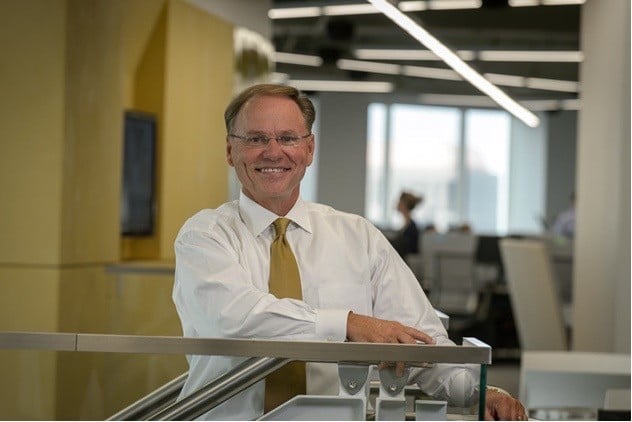When I became publisher of the Sun Herald in 2001, we launched a strategic mission to unite Coastal Mississippi. We expanded distribution, opened a Pascagoula news bureau, and worked to help shape a shared regional identity. Historically, territorial silos had stifled our progress – a challenge our leaders had grappled with for decades. I was determined to play my role to help change that. It would take time, but my team committed to the long haul.
Then, Hurricane Katrina struck in 2005. More than any event in our history, that disaster – the worst natural disaster in American history – demanded a unified response. From tragedy rose unity.
The Sunday after the storm, at a Sun Herald meeting with Gov. Haley Barbour, mayors, and private sector leaders, we agreed recovery required regional collaboration. The Governor’s Commission on Recovery, Rebuilding, and Renewal was born, as detailed in Barbour’s book, America’s Storm: Leading Through Hurricane Katrina. Katrina sparked transformative collaboration. We dreamed big, worked together, and rebuilt. I’ve never worked harder or been prouder than in that moment of unity. Barbour’s book is a must-read for any serious Coastal Mississippi leader. We must never forget the clarion call of regionalism.
Yet, 20 years later, as Katrina’s scars fade and new leaders emerge, complacency, and territorial silos have crept back. Meanwhile, the global economy is shifting rapidly, creating massive opportunities for our region. Plain and simple: we’re missing them. While other regions in Mississippi and beyond land transformative projects, Coastal Mississippi lags.
The Gulf Coast Business Council, formed directly from the Governor’s Commission, drove major wins like the Coastal Mississippi tourism organization, the Knight Nonprofit Center, and more. We fought for the BP money after the Deepwater Horizon oil spill – a potentially transformative fund competing regions lack. Yet, territorialism and politics have infiltrated its management, squandering the historic opportunity. So much so, state leaders paused its use.
It’s time to think big. A recent Business Council and Gulf Coast Restoration Fund Advisory Board meeting sparked hope that leaders feel the urgency. Long Beach Mayor Tim Pierce hit the nail on the head: “We’re not acting as one coast. Every town fights for its piece. We need to focus on what lifts everyone.”
Applause quickly followed Pierce’s comment, and I join them!
Mississippi’s No. 3 national ranking for onshoring jobs in 2025, per the Reshoring Initiative, signals opportunity. North Mississippi’s $2.5 billion aluminum plant shows what’s possible, but Coastal Mississippi’s modest wins are disconnecting from this onshoring surge. Our economic teams are strong, but fragmented efforts limit impact.
To seize this wave, we need a Coastal Mississippi Economic Development Alliance, led by the Gulf Coast Business Council, uniting businesses, local leaders, Mississippi Gulf Coast Community College, the University of Southern Mississippi, William Carey University, our ports, and economic development groups in Harrison, Jackson, and Hancock counties – and potentially all six of the coastal counties.
Our infrastructure is a manufacturer’s dream: the Port of Gulfport, the nationally ranked Port of Pascagoula, CSX and Kansas City Southern rail lines, and highways connecting to Atlanta, Dallas, and Miami. We must promote these assets globally, tap Gulf Coast Restoration funds to build the Alliance and manufacturing infrastructure, streamline permitting to land deals fast, and market Coastal Mississippi as one, powerful region. Every win should be celebrated – press conferences, trade shows, national campaigns – to attract jobs and talent to fill those jobs.
We can do this if we act with urgency. New storms are gathering. AI’s rapid disruption, advancements in automation, and supply chain shifts threaten our core industries – gaming, shipbuilding, and tourism – which cannot drive future job growth alone. We must diversify our economy into advanced manufacturing, aerospace and defense, biotechnology, logistics technology, and AI-driven robotics to counter job losses and fuel prosperity.
Since Katrina, Coastal Mississippi has been the star of its own story – a vibrant tale of resilience, culture, and resurgence. But the script isn’t finished. New challenges loom. Will our story be a triumph of booming, resilient communities embracing AI transformation and sustainable growth? Or will silos, timid leadership, and status-quo thinking hold us back?
As leaders, let’s keep our vision sharp, dream boldly, and form the Coastal Mississippi Economic Development Alliance now. The cameras are rolling. Let’s shape a finale that inspires the world.
I often recall Barbour’s words from his speech at the special legislative session after Katrina, which deeply inspired me: “What will our kids and our kids’ kids say of us? Will they say we got it?” That question still resonates. Let’s answer it with action.
The views expressed by contributors are their own and not the views of SuperTalk Mississippi Media.








